Regulations and Economic Considerations for a Coffee Shop Business
VerifiedAdded on 2023/04/17
|8
|1517
|448
AI Summary
This document discusses the regulations and economic considerations that may affect a coffee shop business, including advertising regulations, minimum wage laws, paid leave laws, interest rates, inflation, and supply and demand. It explores the impact of these factors on the profitability and operations of the business.
Contribute Materials
Your contribution can guide someone’s learning journey. Share your
documents today.
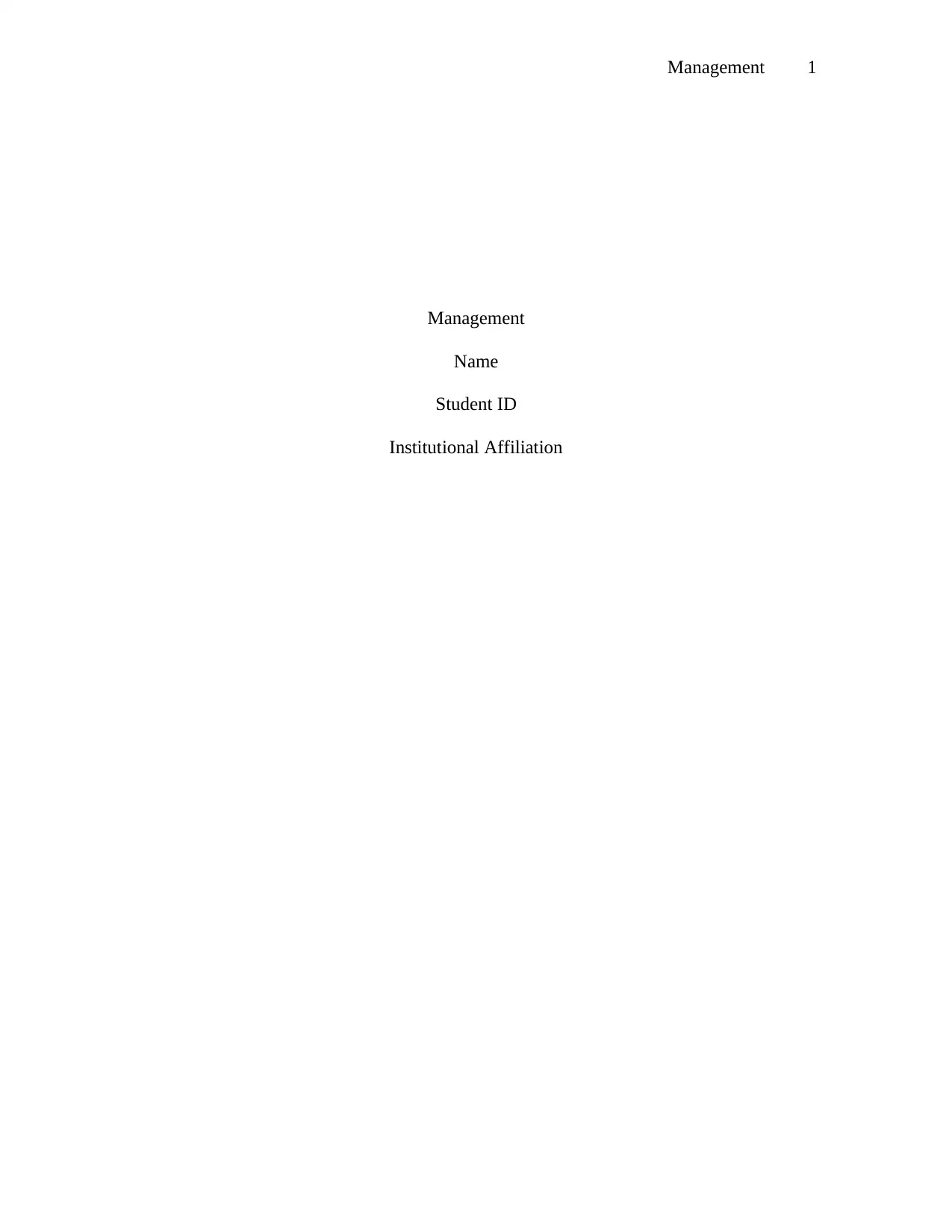
Management 1
Management
Name
Student ID
Institutional Affiliation
Management
Name
Student ID
Institutional Affiliation
Secure Best Marks with AI Grader
Need help grading? Try our AI Grader for instant feedback on your assignments.
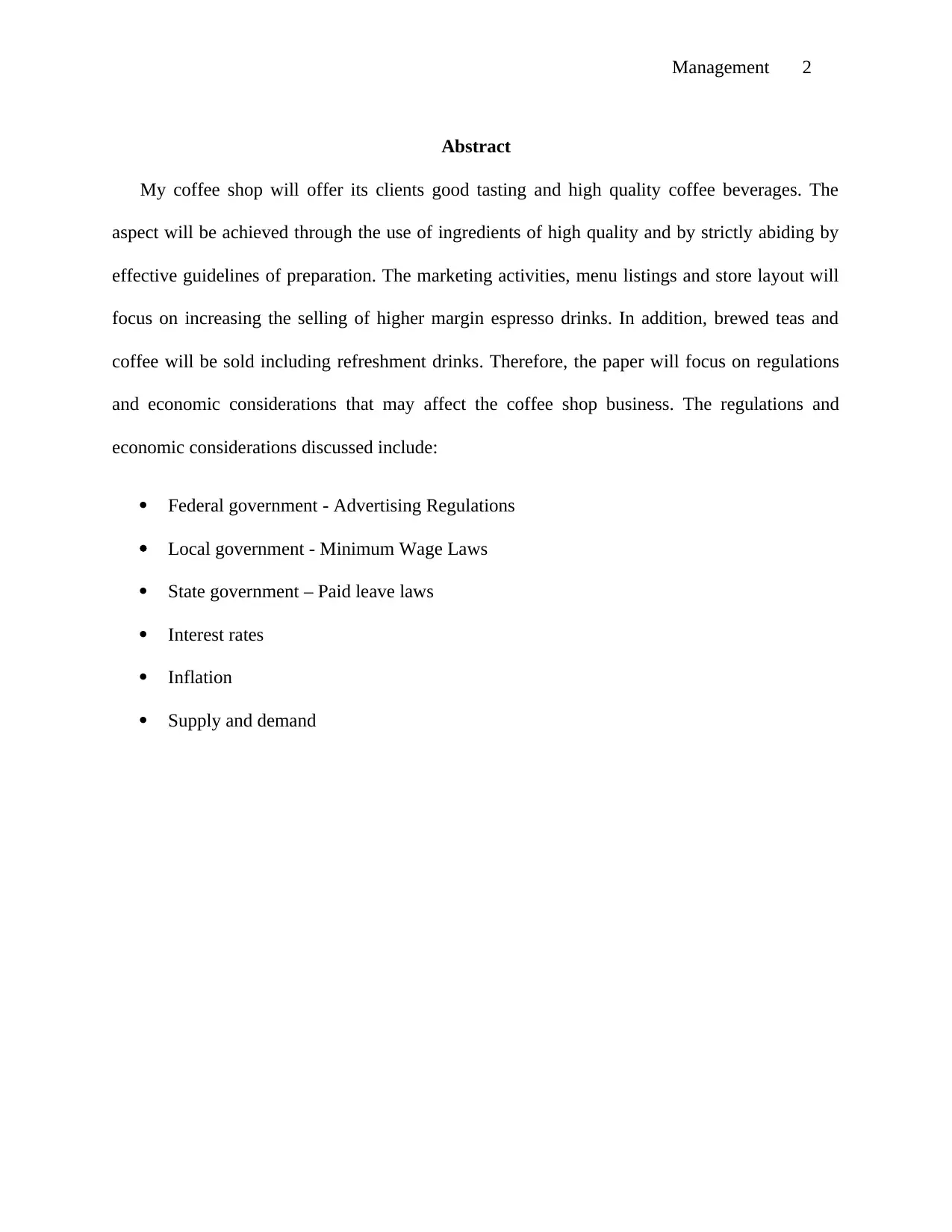
Management 2
Abstract
My coffee shop will offer its clients good tasting and high quality coffee beverages. The
aspect will be achieved through the use of ingredients of high quality and by strictly abiding by
effective guidelines of preparation. The marketing activities, menu listings and store layout will
focus on increasing the selling of higher margin espresso drinks. In addition, brewed teas and
coffee will be sold including refreshment drinks. Therefore, the paper will focus on regulations
and economic considerations that may affect the coffee shop business. The regulations and
economic considerations discussed include:
Federal government - Advertising Regulations
Local government - Minimum Wage Laws
State government – Paid leave laws
Interest rates
Inflation
Supply and demand
Abstract
My coffee shop will offer its clients good tasting and high quality coffee beverages. The
aspect will be achieved through the use of ingredients of high quality and by strictly abiding by
effective guidelines of preparation. The marketing activities, menu listings and store layout will
focus on increasing the selling of higher margin espresso drinks. In addition, brewed teas and
coffee will be sold including refreshment drinks. Therefore, the paper will focus on regulations
and economic considerations that may affect the coffee shop business. The regulations and
economic considerations discussed include:
Federal government - Advertising Regulations
Local government - Minimum Wage Laws
State government – Paid leave laws
Interest rates
Inflation
Supply and demand
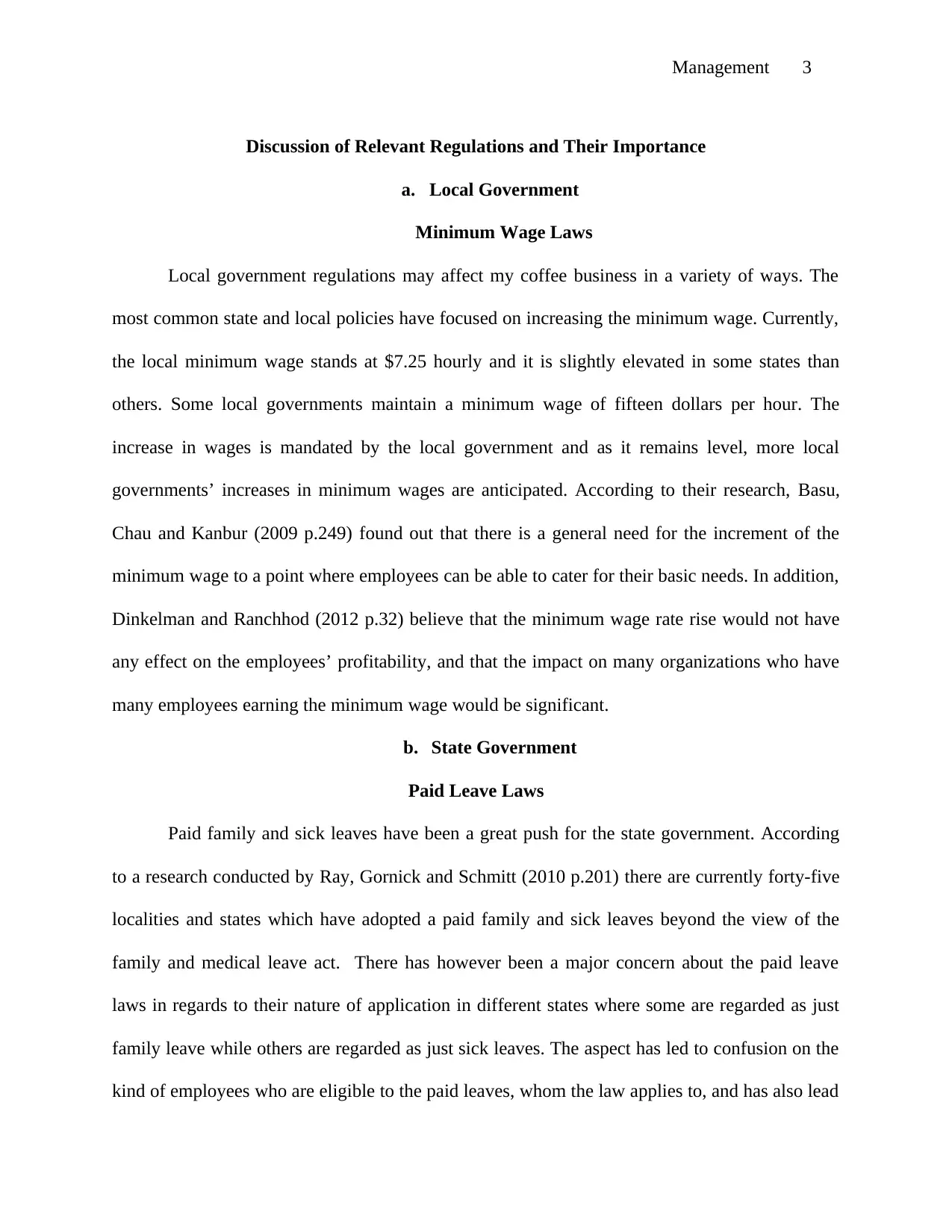
Management 3
Discussion of Relevant Regulations and Their Importance
a. Local Government
Minimum Wage Laws
Local government regulations may affect my coffee business in a variety of ways. The
most common state and local policies have focused on increasing the minimum wage. Currently,
the local minimum wage stands at $7.25 hourly and it is slightly elevated in some states than
others. Some local governments maintain a minimum wage of fifteen dollars per hour. The
increase in wages is mandated by the local government and as it remains level, more local
governments’ increases in minimum wages are anticipated. According to their research, Basu,
Chau and Kanbur (2009 p.249) found out that there is a general need for the increment of the
minimum wage to a point where employees can be able to cater for their basic needs. In addition,
Dinkelman and Ranchhod (2012 p.32) believe that the minimum wage rate rise would not have
any effect on the employees’ profitability, and that the impact on many organizations who have
many employees earning the minimum wage would be significant.
b. State Government
Paid Leave Laws
Paid family and sick leaves have been a great push for the state government. According
to a research conducted by Ray, Gornick and Schmitt (2010 p.201) there are currently forty-five
localities and states which have adopted a paid family and sick leaves beyond the view of the
family and medical leave act. There has however been a major concern about the paid leave
laws in regards to their nature of application in different states where some are regarded as just
family leave while others are regarded as just sick leaves. The aspect has led to confusion on the
kind of employees who are eligible to the paid leaves, whom the law applies to, and has also lead
Discussion of Relevant Regulations and Their Importance
a. Local Government
Minimum Wage Laws
Local government regulations may affect my coffee business in a variety of ways. The
most common state and local policies have focused on increasing the minimum wage. Currently,
the local minimum wage stands at $7.25 hourly and it is slightly elevated in some states than
others. Some local governments maintain a minimum wage of fifteen dollars per hour. The
increase in wages is mandated by the local government and as it remains level, more local
governments’ increases in minimum wages are anticipated. According to their research, Basu,
Chau and Kanbur (2009 p.249) found out that there is a general need for the increment of the
minimum wage to a point where employees can be able to cater for their basic needs. In addition,
Dinkelman and Ranchhod (2012 p.32) believe that the minimum wage rate rise would not have
any effect on the employees’ profitability, and that the impact on many organizations who have
many employees earning the minimum wage would be significant.
b. State Government
Paid Leave Laws
Paid family and sick leaves have been a great push for the state government. According
to a research conducted by Ray, Gornick and Schmitt (2010 p.201) there are currently forty-five
localities and states which have adopted a paid family and sick leaves beyond the view of the
family and medical leave act. There has however been a major concern about the paid leave
laws in regards to their nature of application in different states where some are regarded as just
family leave while others are regarded as just sick leaves. The aspect has led to confusion on the
kind of employees who are eligible to the paid leaves, whom the law applies to, and has also lead
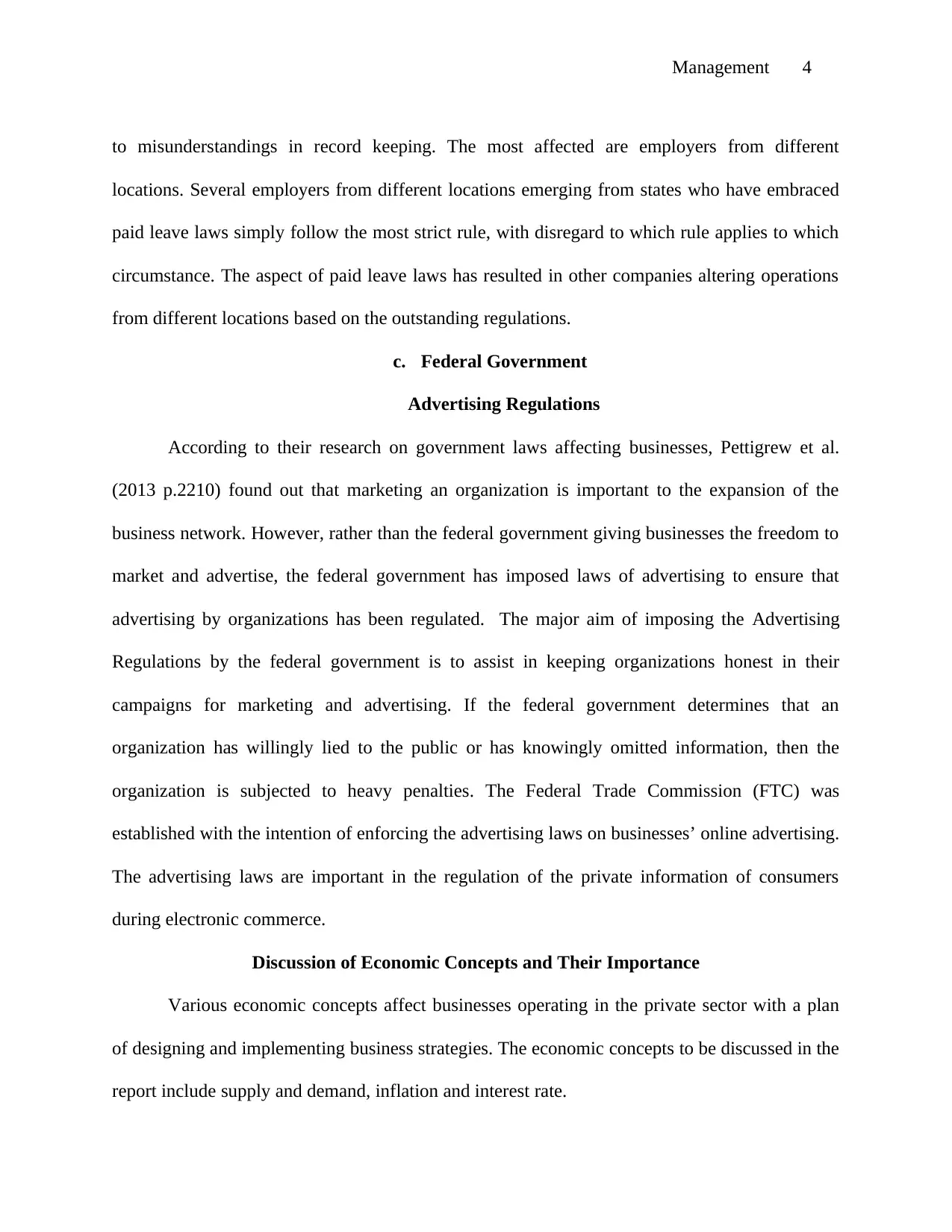
Management 4
to misunderstandings in record keeping. The most affected are employers from different
locations. Several employers from different locations emerging from states who have embraced
paid leave laws simply follow the most strict rule, with disregard to which rule applies to which
circumstance. The aspect of paid leave laws has resulted in other companies altering operations
from different locations based on the outstanding regulations.
c. Federal Government
Advertising Regulations
According to their research on government laws affecting businesses, Pettigrew et al.
(2013 p.2210) found out that marketing an organization is important to the expansion of the
business network. However, rather than the federal government giving businesses the freedom to
market and advertise, the federal government has imposed laws of advertising to ensure that
advertising by organizations has been regulated. The major aim of imposing the Advertising
Regulations by the federal government is to assist in keeping organizations honest in their
campaigns for marketing and advertising. If the federal government determines that an
organization has willingly lied to the public or has knowingly omitted information, then the
organization is subjected to heavy penalties. The Federal Trade Commission (FTC) was
established with the intention of enforcing the advertising laws on businesses’ online advertising.
The advertising laws are important in the regulation of the private information of consumers
during electronic commerce.
Discussion of Economic Concepts and Their Importance
Various economic concepts affect businesses operating in the private sector with a plan
of designing and implementing business strategies. The economic concepts to be discussed in the
report include supply and demand, inflation and interest rate.
to misunderstandings in record keeping. The most affected are employers from different
locations. Several employers from different locations emerging from states who have embraced
paid leave laws simply follow the most strict rule, with disregard to which rule applies to which
circumstance. The aspect of paid leave laws has resulted in other companies altering operations
from different locations based on the outstanding regulations.
c. Federal Government
Advertising Regulations
According to their research on government laws affecting businesses, Pettigrew et al.
(2013 p.2210) found out that marketing an organization is important to the expansion of the
business network. However, rather than the federal government giving businesses the freedom to
market and advertise, the federal government has imposed laws of advertising to ensure that
advertising by organizations has been regulated. The major aim of imposing the Advertising
Regulations by the federal government is to assist in keeping organizations honest in their
campaigns for marketing and advertising. If the federal government determines that an
organization has willingly lied to the public or has knowingly omitted information, then the
organization is subjected to heavy penalties. The Federal Trade Commission (FTC) was
established with the intention of enforcing the advertising laws on businesses’ online advertising.
The advertising laws are important in the regulation of the private information of consumers
during electronic commerce.
Discussion of Economic Concepts and Their Importance
Various economic concepts affect businesses operating in the private sector with a plan
of designing and implementing business strategies. The economic concepts to be discussed in the
report include supply and demand, inflation and interest rate.
Secure Best Marks with AI Grader
Need help grading? Try our AI Grader for instant feedback on your assignments.
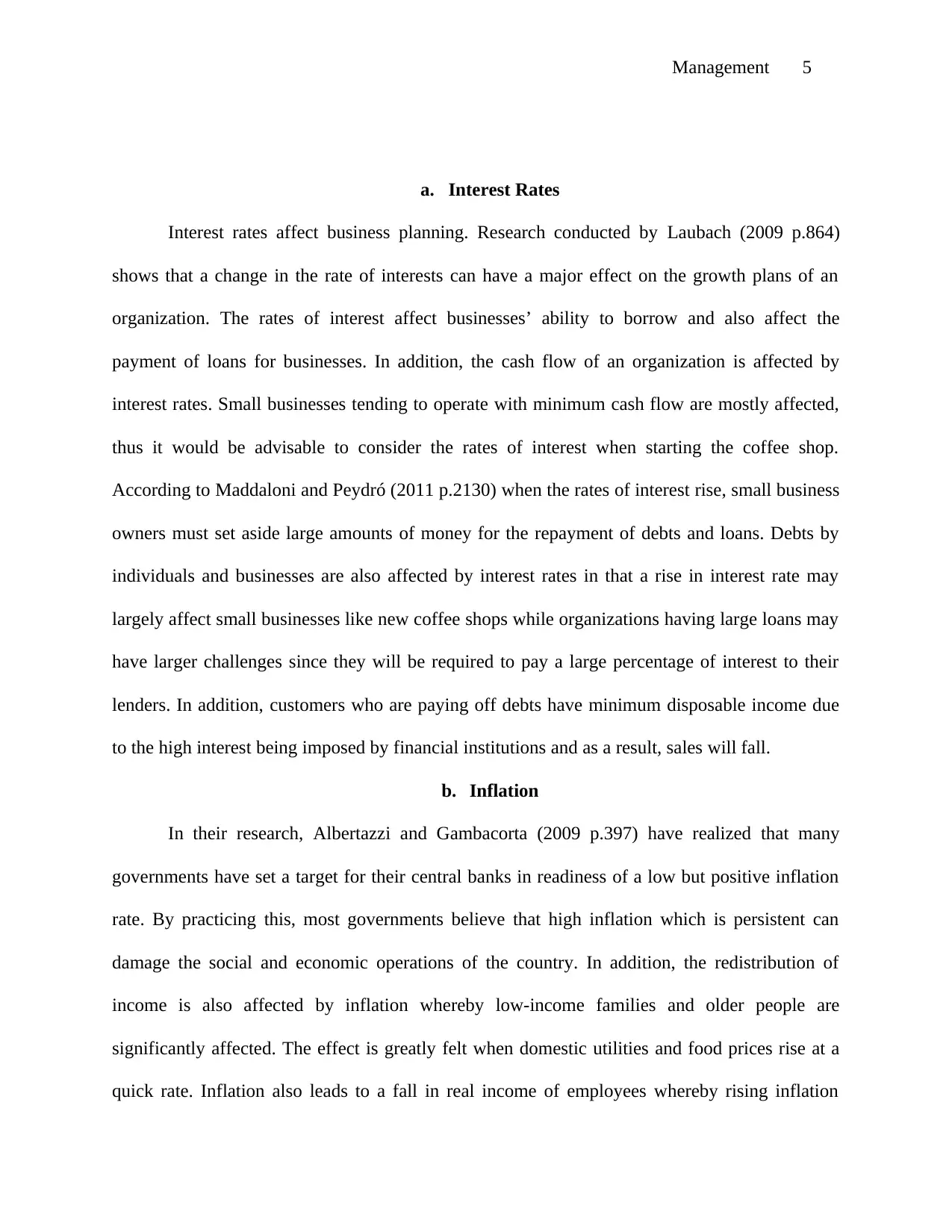
Management 5
a. Interest Rates
Interest rates affect business planning. Research conducted by Laubach (2009 p.864)
shows that a change in the rate of interests can have a major effect on the growth plans of an
organization. The rates of interest affect businesses’ ability to borrow and also affect the
payment of loans for businesses. In addition, the cash flow of an organization is affected by
interest rates. Small businesses tending to operate with minimum cash flow are mostly affected,
thus it would be advisable to consider the rates of interest when starting the coffee shop.
According to Maddaloni and Peydró (2011 p.2130) when the rates of interest rise, small business
owners must set aside large amounts of money for the repayment of debts and loans. Debts by
individuals and businesses are also affected by interest rates in that a rise in interest rate may
largely affect small businesses like new coffee shops while organizations having large loans may
have larger challenges since they will be required to pay a large percentage of interest to their
lenders. In addition, customers who are paying off debts have minimum disposable income due
to the high interest being imposed by financial institutions and as a result, sales will fall.
b. Inflation
In their research, Albertazzi and Gambacorta (2009 p.397) have realized that many
governments have set a target for their central banks in readiness of a low but positive inflation
rate. By practicing this, most governments believe that high inflation which is persistent can
damage the social and economic operations of the country. In addition, the redistribution of
income is also affected by inflation whereby low-income families and older people are
significantly affected. The effect is greatly felt when domestic utilities and food prices rise at a
quick rate. Inflation also leads to a fall in real income of employees whereby rising inflation
a. Interest Rates
Interest rates affect business planning. Research conducted by Laubach (2009 p.864)
shows that a change in the rate of interests can have a major effect on the growth plans of an
organization. The rates of interest affect businesses’ ability to borrow and also affect the
payment of loans for businesses. In addition, the cash flow of an organization is affected by
interest rates. Small businesses tending to operate with minimum cash flow are mostly affected,
thus it would be advisable to consider the rates of interest when starting the coffee shop.
According to Maddaloni and Peydró (2011 p.2130) when the rates of interest rise, small business
owners must set aside large amounts of money for the repayment of debts and loans. Debts by
individuals and businesses are also affected by interest rates in that a rise in interest rate may
largely affect small businesses like new coffee shops while organizations having large loans may
have larger challenges since they will be required to pay a large percentage of interest to their
lenders. In addition, customers who are paying off debts have minimum disposable income due
to the high interest being imposed by financial institutions and as a result, sales will fall.
b. Inflation
In their research, Albertazzi and Gambacorta (2009 p.397) have realized that many
governments have set a target for their central banks in readiness of a low but positive inflation
rate. By practicing this, most governments believe that high inflation which is persistent can
damage the social and economic operations of the country. In addition, the redistribution of
income is also affected by inflation whereby low-income families and older people are
significantly affected. The effect is greatly felt when domestic utilities and food prices rise at a
quick rate. Inflation also leads to a fall in real income of employees whereby rising inflation
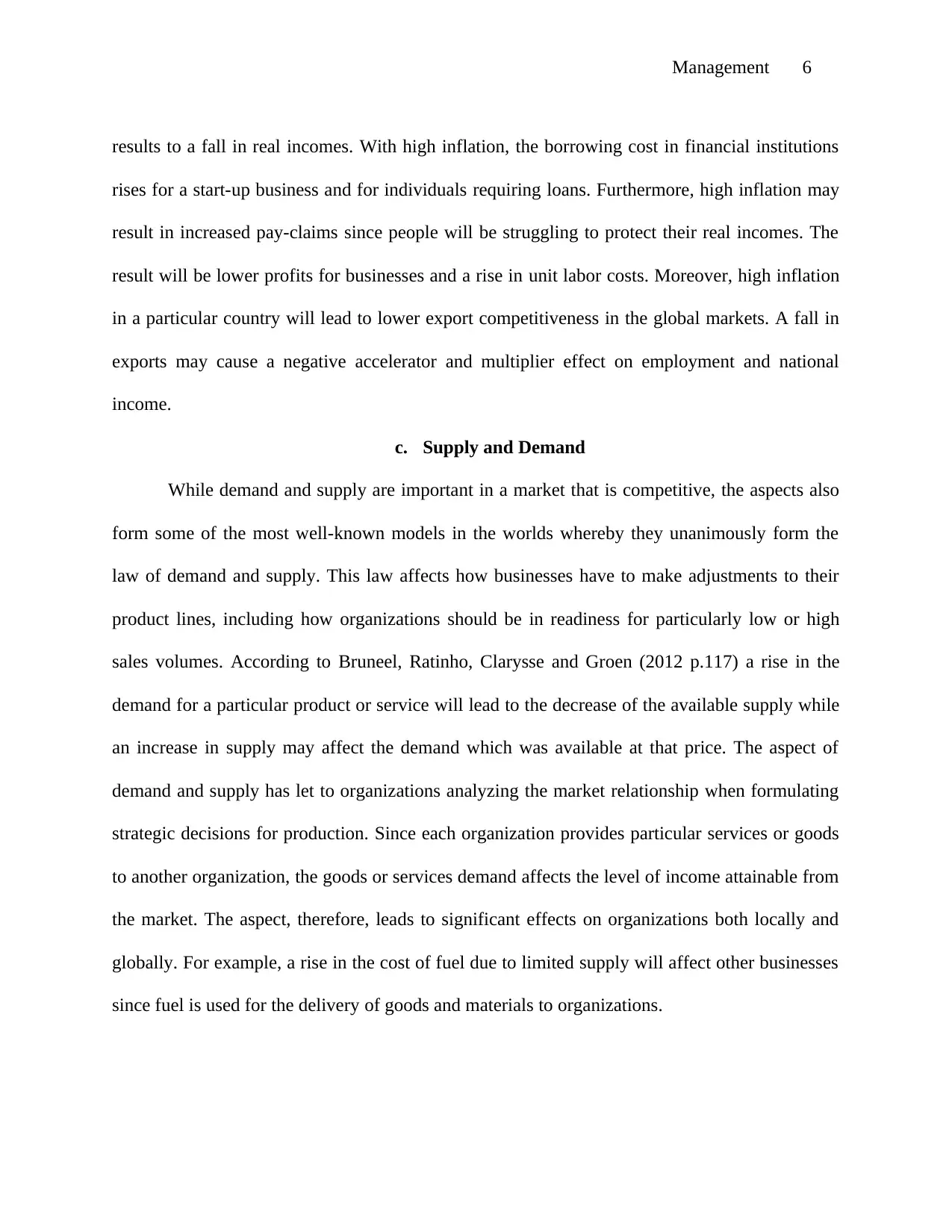
Management 6
results to a fall in real incomes. With high inflation, the borrowing cost in financial institutions
rises for a start-up business and for individuals requiring loans. Furthermore, high inflation may
result in increased pay-claims since people will be struggling to protect their real incomes. The
result will be lower profits for businesses and a rise in unit labor costs. Moreover, high inflation
in a particular country will lead to lower export competitiveness in the global markets. A fall in
exports may cause a negative accelerator and multiplier effect on employment and national
income.
c. Supply and Demand
While demand and supply are important in a market that is competitive, the aspects also
form some of the most well-known models in the worlds whereby they unanimously form the
law of demand and supply. This law affects how businesses have to make adjustments to their
product lines, including how organizations should be in readiness for particularly low or high
sales volumes. According to Bruneel, Ratinho, Clarysse and Groen (2012 p.117) a rise in the
demand for a particular product or service will lead to the decrease of the available supply while
an increase in supply may affect the demand which was available at that price. The aspect of
demand and supply has let to organizations analyzing the market relationship when formulating
strategic decisions for production. Since each organization provides particular services or goods
to another organization, the goods or services demand affects the level of income attainable from
the market. The aspect, therefore, leads to significant effects on organizations both locally and
globally. For example, a rise in the cost of fuel due to limited supply will affect other businesses
since fuel is used for the delivery of goods and materials to organizations.
results to a fall in real incomes. With high inflation, the borrowing cost in financial institutions
rises for a start-up business and for individuals requiring loans. Furthermore, high inflation may
result in increased pay-claims since people will be struggling to protect their real incomes. The
result will be lower profits for businesses and a rise in unit labor costs. Moreover, high inflation
in a particular country will lead to lower export competitiveness in the global markets. A fall in
exports may cause a negative accelerator and multiplier effect on employment and national
income.
c. Supply and Demand
While demand and supply are important in a market that is competitive, the aspects also
form some of the most well-known models in the worlds whereby they unanimously form the
law of demand and supply. This law affects how businesses have to make adjustments to their
product lines, including how organizations should be in readiness for particularly low or high
sales volumes. According to Bruneel, Ratinho, Clarysse and Groen (2012 p.117) a rise in the
demand for a particular product or service will lead to the decrease of the available supply while
an increase in supply may affect the demand which was available at that price. The aspect of
demand and supply has let to organizations analyzing the market relationship when formulating
strategic decisions for production. Since each organization provides particular services or goods
to another organization, the goods or services demand affects the level of income attainable from
the market. The aspect, therefore, leads to significant effects on organizations both locally and
globally. For example, a rise in the cost of fuel due to limited supply will affect other businesses
since fuel is used for the delivery of goods and materials to organizations.
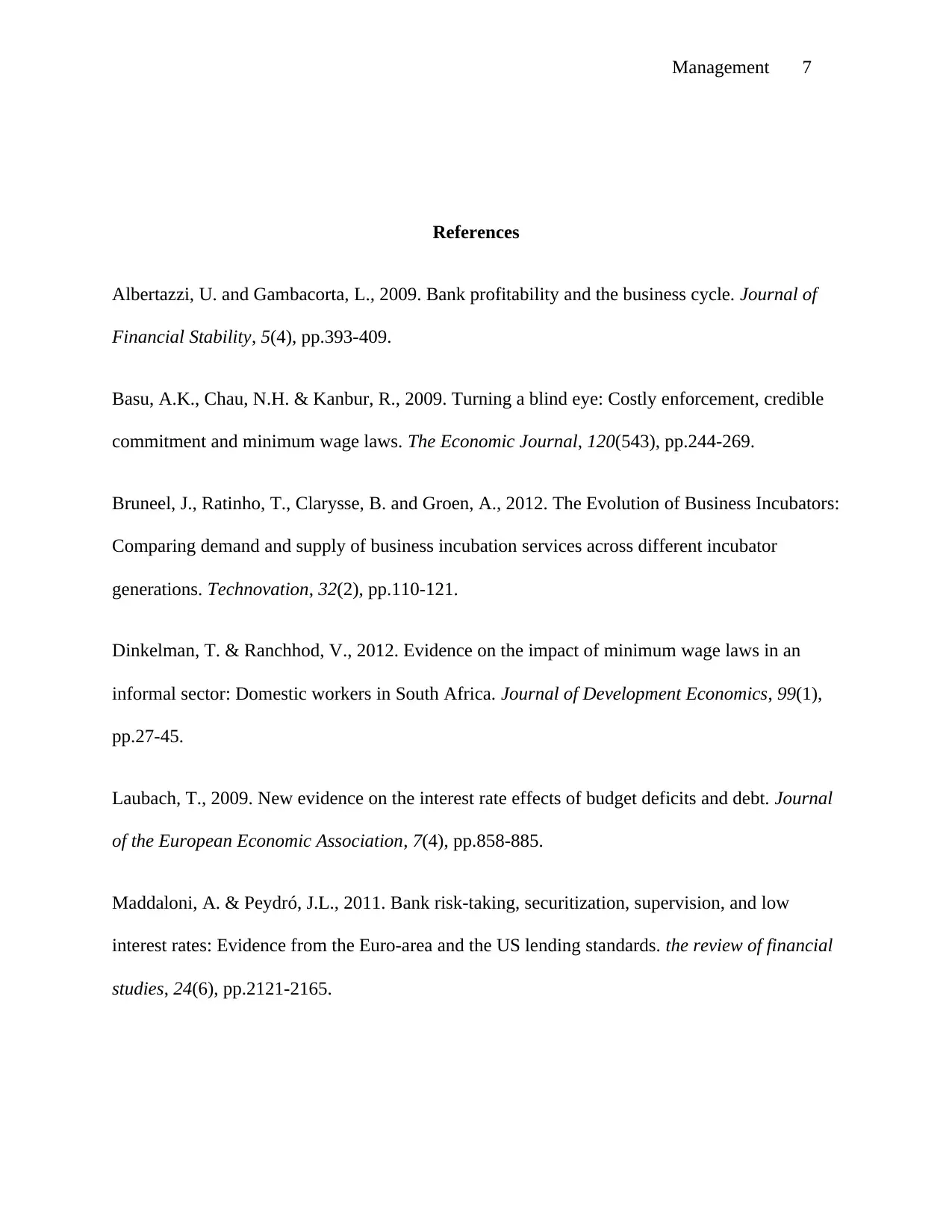
Management 7
References
Albertazzi, U. and Gambacorta, L., 2009. Bank profitability and the business cycle. Journal of
Financial Stability, 5(4), pp.393-409.
Basu, A.K., Chau, N.H. & Kanbur, R., 2009. Turning a blind eye: Costly enforcement, credible
commitment and minimum wage laws. The Economic Journal, 120(543), pp.244-269.
Bruneel, J., Ratinho, T., Clarysse, B. and Groen, A., 2012. The Evolution of Business Incubators:
Comparing demand and supply of business incubation services across different incubator
generations. Technovation, 32(2), pp.110-121.
Dinkelman, T. & Ranchhod, V., 2012. Evidence on the impact of minimum wage laws in an
informal sector: Domestic workers in South Africa. Journal of Development Economics, 99(1),
pp.27-45.
Laubach, T., 2009. New evidence on the interest rate effects of budget deficits and debt. Journal
of the European Economic Association, 7(4), pp.858-885.
Maddaloni, A. & Peydró, J.L., 2011. Bank risk-taking, securitization, supervision, and low
interest rates: Evidence from the Euro-area and the US lending standards. the review of financial
studies, 24(6), pp.2121-2165.
References
Albertazzi, U. and Gambacorta, L., 2009. Bank profitability and the business cycle. Journal of
Financial Stability, 5(4), pp.393-409.
Basu, A.K., Chau, N.H. & Kanbur, R., 2009. Turning a blind eye: Costly enforcement, credible
commitment and minimum wage laws. The Economic Journal, 120(543), pp.244-269.
Bruneel, J., Ratinho, T., Clarysse, B. and Groen, A., 2012. The Evolution of Business Incubators:
Comparing demand and supply of business incubation services across different incubator
generations. Technovation, 32(2), pp.110-121.
Dinkelman, T. & Ranchhod, V., 2012. Evidence on the impact of minimum wage laws in an
informal sector: Domestic workers in South Africa. Journal of Development Economics, 99(1),
pp.27-45.
Laubach, T., 2009. New evidence on the interest rate effects of budget deficits and debt. Journal
of the European Economic Association, 7(4), pp.858-885.
Maddaloni, A. & Peydró, J.L., 2011. Bank risk-taking, securitization, supervision, and low
interest rates: Evidence from the Euro-area and the US lending standards. the review of financial
studies, 24(6), pp.2121-2165.
Paraphrase This Document
Need a fresh take? Get an instant paraphrase of this document with our AI Paraphraser
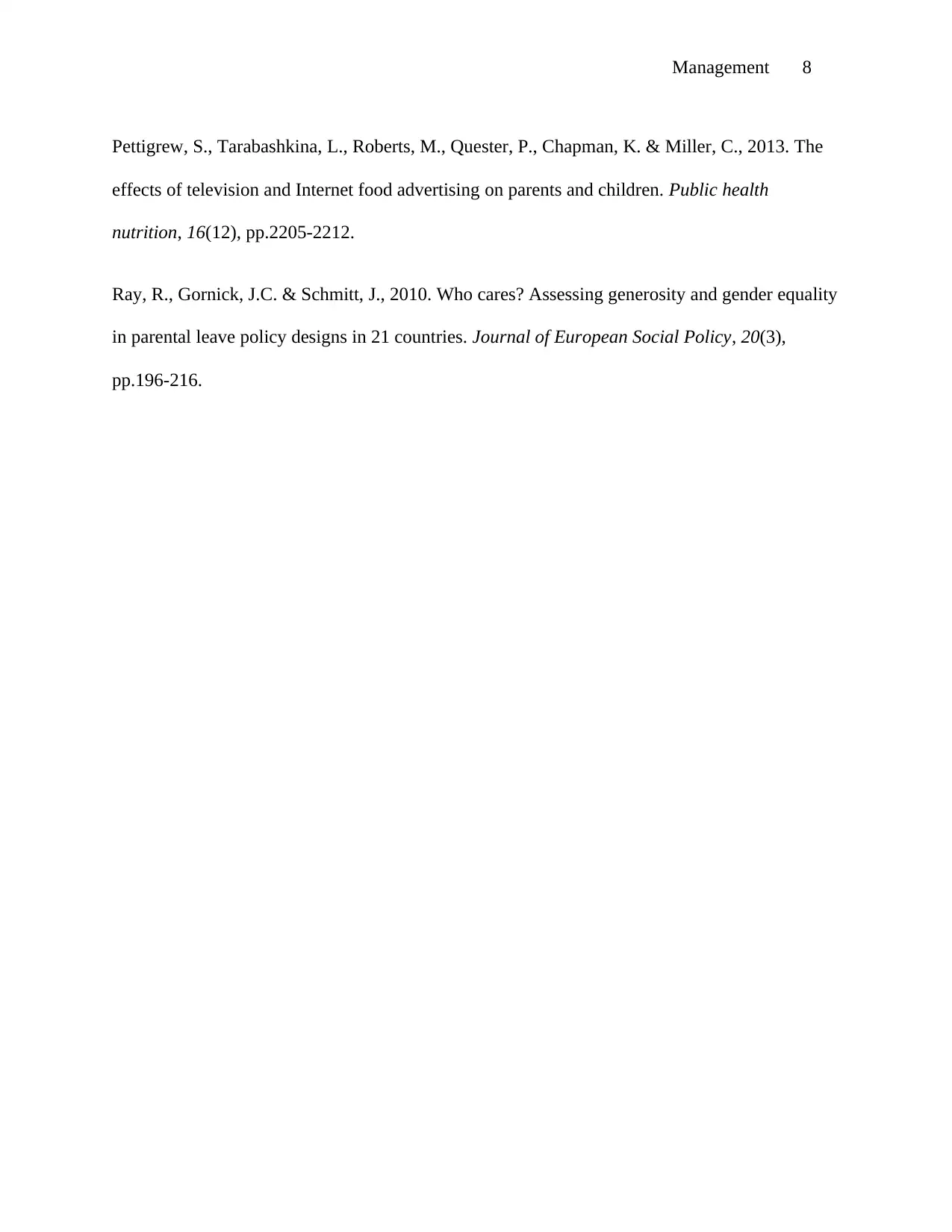
Management 8
Pettigrew, S., Tarabashkina, L., Roberts, M., Quester, P., Chapman, K. & Miller, C., 2013. The
effects of television and Internet food advertising on parents and children. Public health
nutrition, 16(12), pp.2205-2212.
Ray, R., Gornick, J.C. & Schmitt, J., 2010. Who cares? Assessing generosity and gender equality
in parental leave policy designs in 21 countries. Journal of European Social Policy, 20(3),
pp.196-216.
Pettigrew, S., Tarabashkina, L., Roberts, M., Quester, P., Chapman, K. & Miller, C., 2013. The
effects of television and Internet food advertising on parents and children. Public health
nutrition, 16(12), pp.2205-2212.
Ray, R., Gornick, J.C. & Schmitt, J., 2010. Who cares? Assessing generosity and gender equality
in parental leave policy designs in 21 countries. Journal of European Social Policy, 20(3),
pp.196-216.
1 out of 8
Related Documents
Your All-in-One AI-Powered Toolkit for Academic Success.
+13062052269
info@desklib.com
Available 24*7 on WhatsApp / Email
![[object Object]](/_next/static/media/star-bottom.7253800d.svg)
Unlock your academic potential
© 2024 | Zucol Services PVT LTD | All rights reserved.





